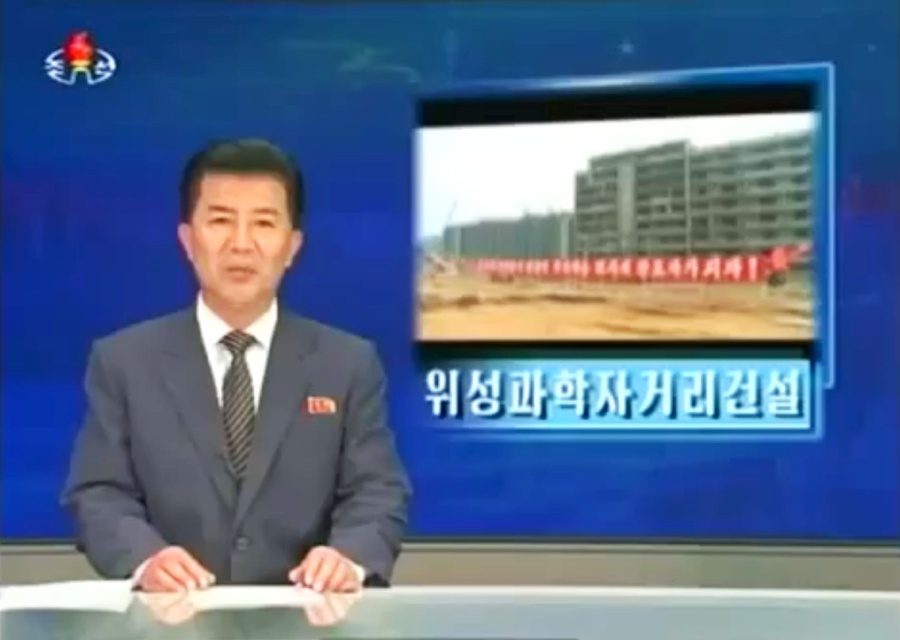 As will surprise none of his regular readers, Joshua Stanton has criticized the AP for not covering the event of an apartment building collapsing in North Korea’s capitol sooner. http://freekorea.us/2014/05/18/if-a-building-falls-in-pyongyang-and-ap-doesnt-hear-it-why-the-fuck-is-it-even-there/ Stanton’s profane title notwithstanding, his post points rather to a line of inquiry that is potentially interesting: Even though “we” have a bureau in North Korea and are able to read a growing number of defector outlets for news from that country, we are still sometimes completely dependent on the DPRK itself informing us of major events. The status of singer Hyun Song-wol (i.e., that she is still living) is another case where defector outlets and foreign media reporting had either no information or outright disinformation, and the DPRK state media finally provided something conclusive. In a way, that gives North Korea a certain power over news narratives that it could use more often.
As will surprise none of his regular readers, Joshua Stanton has criticized the AP for not covering the event of an apartment building collapsing in North Korea’s capitol sooner. http://freekorea.us/2014/05/18/if-a-building-falls-in-pyongyang-and-ap-doesnt-hear-it-why-the-fuck-is-it-even-there/ Stanton’s profane title notwithstanding, his post points rather to a line of inquiry that is potentially interesting: Even though “we” have a bureau in North Korea and are able to read a growing number of defector outlets for news from that country, we are still sometimes completely dependent on the DPRK itself informing us of major events. The status of singer Hyun Song-wol (i.e., that she is still living) is another case where defector outlets and foreign media reporting had either no information or outright disinformation, and the DPRK state media finally provided something conclusive. In a way, that gives North Korea a certain power over news narratives that it could use more often.
But what I find even more interesting is the lengths to which the North Korean government went to make sure that journalists and diplomats from friendly countries, including China, were not able to cover the event. This has gone completely unremarked in the recent coverage in English about the apartment collapse.
Like the AP, Xinhua (the state news agency for the Chinese Communist Party) has a bureau in Pyongyang. After the accident, the North Koreans set up a visit for the Xinhua bureau, the Chinese Embassy in Pyongyang, and a number of other foreign diplomatic attaches — not to the sight of actual news (i.e. the accident) but instead sent them to Wonsan, a city rather far away on the east coast of Korea. She Baiyu, the Xinhua photographer in North Korea, thus produced a photo essay praising the care with which Kim Jong-un has lavished the Songdowon International Youth Camp in Wonsan.
This kind of activity allowed the North Korean state to claim it’s working harder than ever to improve the lives of the people, while keeping prying eyes out of the streets of the capital city while they finished the extensive clean-up of what must have been an incredibly chaotic site.
Chinese media coverage of the accident was quite muted at first, not even including a photograph of the apologizing official. This to me indicates that the CCP saw too many parallels for its own good in this case, and didn’t want it to be used to obliquely criticize corruption by CCP cadre and lax standards at building sites all over China. And besides, the Xinhua bureau wasn’t necessarily even around to cover it — clever, on the part of the DPRK minders and managers of foreign journalists.
There are a few other points that might be made: This incident indicates how effective the country’s media blockade is, it indicates how much power (and how big the budgets are) in the hands of the military ruling clique, it indicates that the Workers’ Party does want to maintain at least the perception of public accountability, and it indicates what anyone can perceive by going to North Korea or its periphery — that the country’s infrastructure is often in very shoddy condition. Even in Pyongyang, the center of the revolution, the amount of investment and the level of skill being applied to the task of construction has severe limitations.
* This post is based upon an e-mail response to Adam Taylor, the foreign affairs blogger for the Washington Post, who was kind enough to include a couple of my thoughts and a reference to my Twitter feed in his May 20 essay “If a building collapsed in Pyongyang, would anyone know it?” I also spoke with the Post‘s bureau chief in Seoul, Chico Harlan, who kindly quoted me in his May 18 article for the paper’s print edition, entitled “North Korea discloses apartment collapse in Pyongyang.”